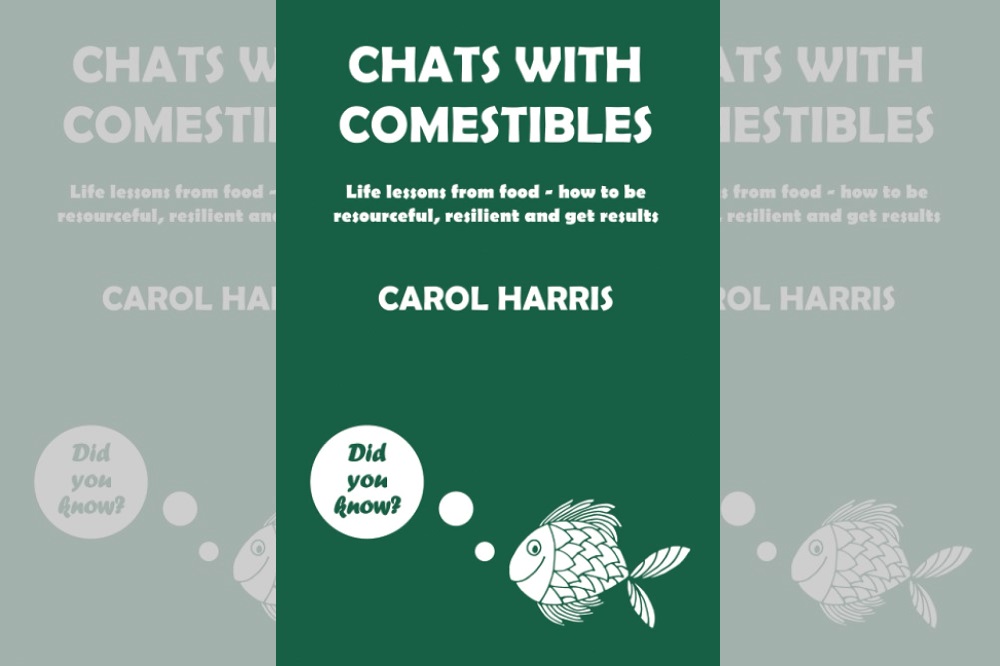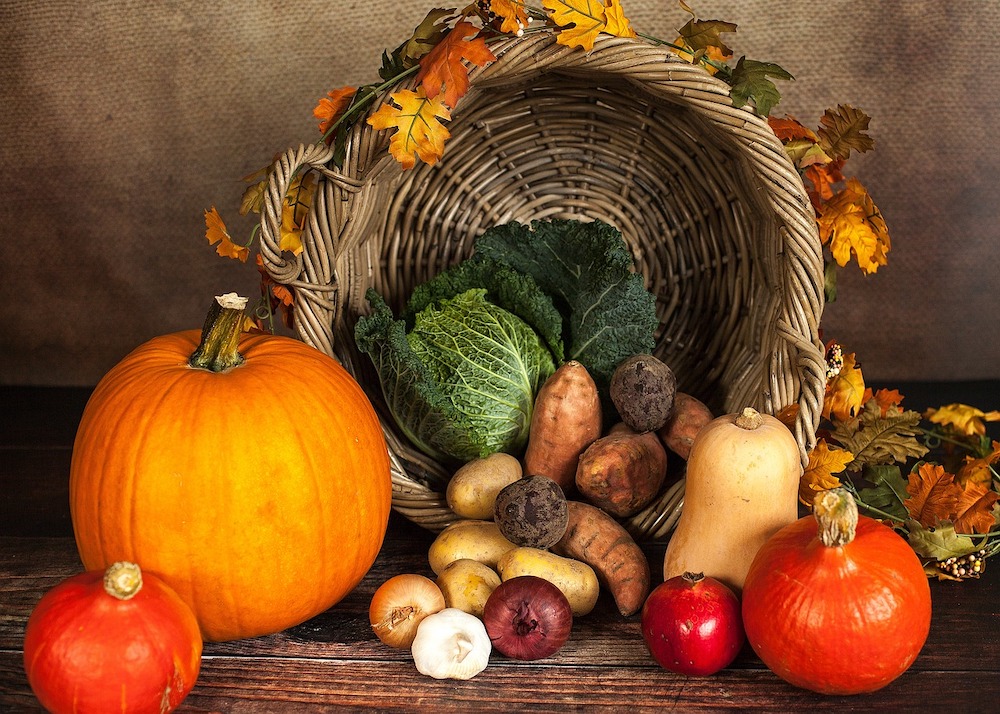Review: Chats with Comestibles: Life lessons from food – how to be resourceful, resilient and get results by Carol Harris

Jon Gower
Even the mighty Dewey Decimal system, designed to help librarians put a book on the right shelf might struggle with putting this quirky but life-affirming volume in its proper place. Talking vegetables? Personal effectiveness? Both of these at the same time?
The book is a series of conversations between the author and various food ingredients, from hake fillets through lamb shoulder and aubergines to pickled garlic, not forgetting a bright and crunchy range of vegetables. Along the way you certainly learn a lot of fascinating stuff. Take this chat with some very patient tarragon vinegar for example:
‘Hello tarragon vinegar. It’s your lucky day – you get an outing.’
‘It’s been a long time coming; it’s so nice to be out of that store cupboard at last. Did you know that Tarragon is part of the sunflower family and our name may have been derived from French, Latin and Arabic words, all of which mean ‘little dragon’.
‘No, I didn’t know that. What’s the connection between Tarragon and dragons?’
‘Apparently Tarragon roots resemble a dragon’s tail, although how anyone would know what a dragon’s tail actually looks like beats me.’
The book is liberally sprinkled or seasoned with such tasty information. How asparagus lasts in the ground for up to 20 years and aubergines come from wild Nightshade plants. Or how pasta means paste and noodles were made in China about 7,000 years ago.
Success
But helping you win the culinary version of Trivial Pursuits isn’t the main point of this book as its aim is to manage ‘your thoughts, feeling and behaviour’ and help build ‘good relationships with others’ as well as achieving success in your chosen activities.
To this end each punchy little nutcracker of a chapter uses the making of a recipe to deliver a simple life lesson, so chatting with an appealing looking block of coconut cream about its relationship to the Caribbean curry powder and chopped up Indian pickle in a simple vegetable dish helps the reader when it comes to ‘Understanding Influence and Assertiveness.’
Making cucumber mousse becomes a way of taking exercise, such as walking around the kitchen as the cream cheese cools to room temperature.
And so encouraging the aubergine in a moussaka to think about the other ingredients finds its analogy in human behaviour: ‘Some people think others are too high up for them to relate to, but if they treated them as they’d like to be treated themselves, those differences wouldn’t matter.’
The author, Carol Harris has been helping people improve their personal and business skills for three decades and more, using neuro linguistic programming as the foundation for much of her work.
This latest book of hers is a fun way of doling out some simple but often fundamental advice about such things as how to listen, using your auditory sense, developing confidence (which can be as simple as making apple pie) and the pleasure of having fun, making popping candy.

Manglewurzels
Along the way you can also pick up some easy-to-make recipes which means the meals one makes can be associated with the lessons learned, including some for foodstuffs that aren’t all that popular, such as fodder beet or manglewurzels, usually thought of as animal food, although served up here very simply, with small bits cooked in olive oil, then turned over to cook in butter, a two-tone sweet and simple dish to go with some more oil and a hunk of bread.
In cooking this up you help understanding your prejudices, such as dismissing some foods as unpalatable, or sticking to your usual circle if friends, just as you do your stock of ingredients in building up a dependable larder.
Tasty metaphors
So what might seem like a book idea bordering on the bonkers turns out to be an engaging, enlivening thing, a volume chock full of tasty metaphors and practical, realizable tips for life.
You may end up never being able to make a rice pudding again without adding freshly grated nutmeg, plump yellow sultanas, cinnamon powder and some rosewater.
Or make a trifle without seeing it as a way of handling potentially stressful situations. And indeed start talking to tinned salmon for a long time whilst making fish balls as a way of building one’s personal resilience.
But the kitchen will never look the same again as will your conversations with the carrots or cheery banter with the butter pudding. Not to mention the joy you feel when you rustle up some cheese and strawberry jam sandwiches, just for a laugh.
Chats with Comestibles: Life lessons from food – how to be resourceful, resilient and get results by Carol Harris is published by Pentre Publications. You can buy a copy here.
Support our Nation today
For the price of a cup of coffee a month you can help us create an independent, not-for-profit, national news service for the people of Wales, by the people of Wales.






